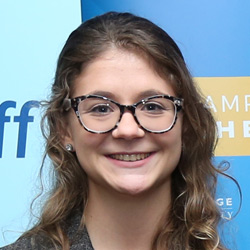
Desiree Halpern
(M.A., International Education Development)
It would be hard to imagine a student better positioned to write about the global refugee crisis than Desiree Halpern. Halpern grew up in Philadelphia, but she spent her summers with her extended family in Poland, where she held dual citizenship. She learned Spanish and French in addition to Polish and English, and lived with a family of women in Tajikistan while interning with the United Nations Development Program. At George Washington University, she minored in Farsi.
When Halpern began applying to graduate schools, her goal was to find a program that would allow her to focus on the empowerment and education of Middle Eastern girls and women.
“I thought maybe I’d made it up,” she says. “But that program very much exists at TC.”
“You have to remove whatever trauma they are feeling at that moment and bring (students in a refugee camp) back to the childhood experience of learning something fun.”
– Desiree Halpern, M.A., International and Comparative Education
For her TC thesis on how religion, culture, displacement and trauma affect the learning experiences of Afghan girls, Halpern interviewed teachers and aid workers in refugee camps in Australia, Greece, Pakistan, Italy and Serbia. Many young women there are second-generation refugees who have never seen Afghanistan, yet still contend with the Taliban’s restrictions on women’s education. Halpern learned that while religion and culture may seem mutually exclusive, the interplay between values and traditions is much more complicated. Ultimately, she believes, interpersonal communication and relationship-building are required to determine what will best serve young girls’ education.
To that end, last summer, Halpern taught young women in an Afghan refugee camp in Greece.
“They had never had a teacher from a foreign community speak their language, so they latched on to me right away,” she says. “They were calling me the Farsi word for ‘auntie.’”
Halpern, who now works for the Scholar Rescue Fund of the Institute of International Education, which secures safe academic environments for persecuted and endangered scholars, believes that neither cultural norms, religious prohibitions nor living conditions can diminish an inherent thirst for knowledge.
“You have to remove whatever trauma they are feeling at that moment and bring them back to the childhood experience of learning something fun.” – Steve Giegerich
Read about TC's 2018 Convocation ceremonies.